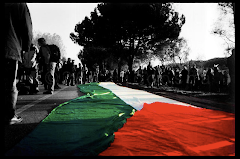Gaza Homes Destruction ‘Wanton’
BBC News
Human rights investigators say Israeli forces engaged in "wanton destruction" of Palestinian homes during the recent conflict in Gaza.
Amnesty International has told the BBC News website the methods used raised concerns about war crimes.
Israel's military said buildings were destroyed because of military "operational needs". The Israeli Defense Forces said they operated in accordance with international law during the conflict.
However, the use of mines to destroy homes contradicted this claim, the head of the Amnesty International fact-finding mission to southern Israel and Gaza, Donatella Rovera, has argued.
Israeli troops had to leave their vehicles to plant the mines, indicating that they faced no danger and that there was no military or operational justification, she said.
Breaking the Silence, an Israeli group that gathers and circulates the testimonies of Israeli soldiers, has also told the BBC News website that its findings from the Gaza war suggested many demolitions had been carried out when there was no immediate threat.
"From the testimonies that we've gathered, lots of demolitions - buildings demolished either by bulldozers or explosives - were done after the area was under Israeli control," said Yehuda Shaul, one of the group's members.
Destruction of civilian property is not illegal in itself under international law, but it must be justifiable on military grounds - for example if the building was booby trapped or being used as cover for enemy fighters.
Thousands of buildings were destroyed in the 22-day Israeli operation. Some of them were police stations, mosques and government premises attacked in targeted airstrikes, in many cases with surrounding buildings left in tact.
Reduced to rubble
There were also whole neighbourhoods reduced to rubble in areas where the Israeli ground forces were present.
Ms Rovera said Amnesty International was concerned about "large scale destruction of homes and other civilian properties" during the conflict.
"The destruction was, in our view, and according to our findings, wanton destruction - it could not be justified on military grounds," she said.
Ms Rovera said her team found fragments of anti-tank mines in and around destroyed properties.
Their use was also consistent with remains of houses, collapsed in on themselves as if blown up from below, rather than destroyed from above as in an airstrike, she said.
Troops would have had to leave their armoured vehicles to plant them and rig up the detonators, she said.
"Unless those operating on the ground felt not just 100% but 200% secure - that the places were not booby trapped, that they wouldn't come under fire - they could not have got out of the vehicles," she said. "They would not have used that method."
"The use of the method tells us even more that there wasn't the kind of danger that might have made it lawful to destroy some of those properties," Ms Rovera said.
"Wanton destruction on a large scale would qualify as a war crime," she said, adding that the practice was among several used in the conflict by both sides that Amnesty is concerned may constitute war crimes.
In one case visited by the BBC, six homes belonging to the extended family of Raed al-Atamna in the Izbit Abed Rabbo area, near the border with Israel, were destroyed. Mr Atamna said a UN ordnance clearance team had found several mines in and around the remains of one of the homes.
He said he and his family had fled the area during the Israeli military operation, and returned to find their homes demolished.
'Substantial operational needs'
The IDF said buildings in the Gaza Strip were destroyed during Operation Cast Lead due to "substantial operational needs".
In a written statement, it said: "For example, buildings were either booby-trapped, located over tunnels, or fire was opened from within them in the direction of IDF soldiers.
"The terrorist organisations operated from within the civilian population, using them as a cover and made cynical use of the IDF's strict rules of engagement, opening fire from within civilian population centres, mosques, schools, hospitals and even private residences of citizens in the Gaza Strip.
"The troops were briefed and trained to avoid harming uninvolved civilians and did all they could to give warning in advance so that civilians could distance themselves from combat zones.
"The IDF emphasises that the terrorist organisation, Hamas, and its infrastructure were the target of Operation Cast Lead, and not the civilian population in Gaza."
A military source said the mines used do not detonate automatically and therefore do not represent a danger when left unexploded in the field.









